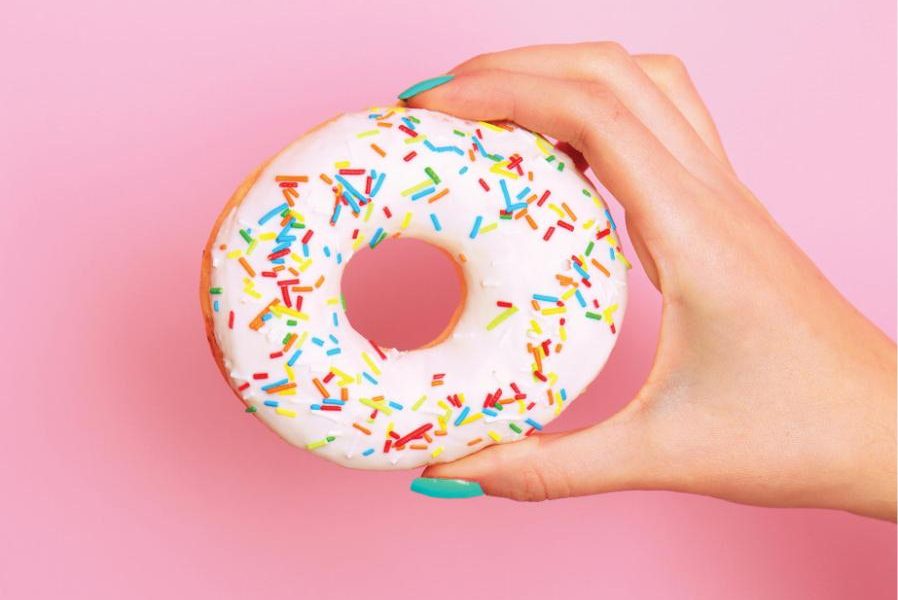Why is it that no matter how hard you try to eat clean, those pesky voices in your head pipe up and refuse to quieten down until you succumb to a bite of something ‘naughty’? Here at YF HQ, we’re all for everything in moderation but sometimes our cravings, quite literally, take the biscuit. Are you struggling to silence your inner cookie monster? Or maybe it’s your lunchtime caffeine addict you need a helping hand with? Well, whatever your preference, we’ve called upon the experts to unmask the root of the five most common cravings and help us quash them once and for all.
You’re craving something salty
Always thought you were a bit of a crisp fiend? In actual fact, craving salt is often a desperate cry that your body needs minerals. “We need minerals such as calcium, sodium, magnesium, zinc and other trace minerals to stay healthy, and one of the signs that your body might be deficient in these is a craving for salt,” says Dr Christy Fergusson, food psychologist for Seasonal Berries and Channel 4’s Secret Eaters. Another common cause for an unexplained hankering for salt is dehydration. “If you are dehydrated, you may crave salt to balance your electrolytes,” explains Dr Christy. So what should you reach for when your body feels like it needs a little something salt-infused? “Try snacking on a handful of olives, a few cubes of feta or have a small bowl of edemame,” suggests nutritional physiologist Rick Hay. And if your food is in need of a little seasoning, opt for pink Himalayan salt or Celtic sea salt over the white table variety for a healthier, mineral-rich alternative.
You’re craving something sweet
“Craving sweet foods can mean that you are stressed or tired and your body is looking for a quick pick-meup,” says Rick Hay. “Also, if you are consuming foods that have a high glycemic load (GL), such as cakes and fizzy drinks, you are more likely to crave sugar,” he adds. Dr Christy agrees and highlights the fact that usually when we’re pining for something sweet, it is generally the aftermath of a sugar-laden treat. “Sugary snacks strap us onto the blood sugar rollercoaster and have us riding high before leaving us crashing in a hot mess shortly after,” she describes. So instead of reaching for something sweet think about what your body actually needs – glucose. “Your brain and body need glucose for energy,” says Dr Christy. “In fact your brain can’t store glucose so you need to give it a fresh supply every three to four hours otherwise you will find your mood and concentration will dip.” Instead of grabbing a biscuit to go with your 4pm cuppa, enjoy fruits with a low GL such as strawberries, blueberries, raspberries and blackberries. Not only are berries high in fructose, they also contain fibre, nutrients and antioxidants to support your health. “Alternatively, you can try eating something slightly bitter to stop the craving,” suggests Rick Hay. “A few squares of organic dark chocolate should do the trick.”
You’re craving caffeine
Can’t get out of bed without a cup of coffee? If you feel like your becoming a little too reliant on caffeine you may want to take note. “Craving caffeine could mean that you need a boost in your catecholamines,” explains Dr Christy. “When you drink coffee, caffeine blocks your adenosine receptors, lowering their activity, which increases the release of the catecholamines dopamine and adrenaline.” Catecholamines are your energisers and motivators, however, what your body really needs is the amino acid tyrosine which boosts mental alertness and is found in an array of foods including bananas, meats, fish, eggs, nuts, beans and oats. Alternatively, opt for green tea which will still provide a smaller caffeine hit alongside a healthy punch of antioxidants, or try a herbal brew which contains licorice for an energy boost.
You’re craving cheese
“Craving cheese could be a sign that you’re not getting enough calcium in your diet,” says Dr Janet Aylott, nutritionist at Nutracheck (nutracheck. co.uk). Although cheese is often condemned by those trying to watch their weight, calcium is essential for bone health and shouldn’t be cut from our diets. “The softer the cheese, the lower the calories so choose something like brie or a cream cheese over cheddar,” recommends Dr Janet. Alternatively, a cheese craving could also be your body’s way of telling you it needs essential fatty acids. “EFAs are the good fats which our body cannot manufacture,” explains Dr Christy. “Therefore we need to get them from our diet. You can increase your intake of omega 3 by snacking on nuts and seeds such as flaxseeds, walnuts and pumpkin seeds as well as consuming oily fish like tuna, salmon and trout.”
You’re craving carbs
Find yourself yearning for pasta? We feel your pain, but did you know that a want for carbs could mean that you are lacking energy? “Choosing more complex carbohydrates such as wholegrain breads, cereals and pasta, brown rice and oats can help to manage cravings by keeping you fuller for longer,” advises Dr Janet. It could also be a sign that you’re lacking in happy hormone serotonin. “As our serotonin levels drop our brain seeks balance. Hello carb cravings,” says Dr Christy. “Refined carbohydrates spike our bloody sugar levels causing our amino acids to get shunted out of our cells ends, giving tryptophan a free ride across our brain barrier. This gives us a temporary boost but when our blood sugar plummets again, the cravings will return.” Instead, try reaching for good quality protein which will provide your body with a supply of amino acids, namely tryptophan, which will convert to serototin.
Smart sugar-free swaps
- Sugary breakfast cereals → Porridge with fresh berries
- Shop bought snack bars → Vegetable sticks, nuts and seeds
- Desserts → Homemade sugar-free pancakes with berries, sliced banana and a dollop of plain yoghurt
- Fizzy drinks → Water infused with lemon, cucumber or mint leaves
- Ice cream → sugar-free jelly and natural yoghurt
- Processed peanut butter → Homemade nut butter
- Teaspoon of sugar in your coffee → Teaspoon of cinnamon or cacao




















